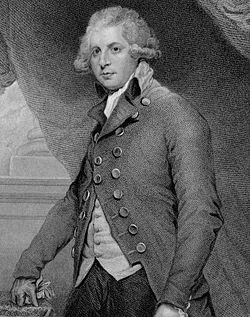
To Sheridan
Encyclopedia

Samuel Taylor Coleridge
Samuel Taylor Coleridge was an English poet, Romantic, literary critic and philosopher who, with his friend William Wordsworth, was a founder of the Romantic Movement in England and a member of the Lake Poets. He is probably best known for his poems The Rime of the Ancient Mariner and Kubla...
and published in the 29 January 1795 Morning Chronicle. As the last poem running as part of the Sonnets on Eminent Characters
Sonnets on Eminent Characters
Sonnets on Eminent Characters or Sonnets on Eminent Contemporaries is an 11 part sonnet series created by Samuel Taylor Coleridge and printed in the Morning Chronicle between 1 December 1794 and 31 January 1795...
series, it describes Coleridge's appreciation of Richard Brinsley Sheridan
Richard Brinsley Sheridan
Richard Brinsley Butler Sheridan was an Irish-born playwright and poet and long-term owner of the London Theatre Royal, Drury Lane. For thirty-two years he was also a Whig Member of the British House of Commons for Stafford , Westminster and Ilchester...
and his theatre talents. Coleridge, unlike most, preferred Sheridan's somber works over his comedies and emphasizes them within the poem. Coleridge also respects Sheridan's political actions.
Background
Coleridge's "To Richard Brinsley Sheridan, Esq." became the final poem in his Sonnets on Eminent Characters series when it was published in the 29 January 1795 Morning Chronicle. It was revised somewhat and published again in Coleridge's 1796 collection of poems with a note about Hymettian Flowrets. It was reprinted again in 1803 without any changes. The poem was included in Coleridge's collections in 1828, 1829, and 1834, with the only change being the removal of the note.Sheridan was a famous comic playwright, but Coleridge emphasized the sentimental aspects of Sheridan's writing. The connection that Coleridge felt in regards to the sadder works of Sheridan is what prompted him to dedicate a poem to the playwright and not to someone else, such as a political figure. Coleridge also had a personal connection to Sheridan through his friendship with William Smyth, the tutor to Thomas Sheridan, the playwright's son. Coleridge also knew of Sheridan as a political figure; Sheridan was a witness during the 1794 Treason Trials
1794 Treason Trials
The 1794 Treason Trials, arranged by the administration of William Pitt, were intended to cripple the British radical movement of the 1790s. Over thirty radicals were initially arrested; three were tried for high treason: Thomas Hardy, John Horne Tooke and John Thelwall...
and also argued for the repeal of the Habeas Corpus Suspension Act. A speech on the matter was printed in the January Morning Chronicle before Coleridge's sonnet was published.
Poem
The 1796 edition of the poem read:- It was some spirit, SHERIDAN1 that breath'd
- O'er thy young mind such wildly-various power!
- My soul hath mark'd thee in her shaping hour,
- They temples with Hymettian flowrets wreath'd:
- And sweet thy voice, as when o'er Laura's bier
- Sad music trembled thro' Vauclusa's glade;
- Sweet, as at dawn the love-lorn Serenade
- That wafts soft dreams to Slumber's list'ning ear.
- Now patriot Rage and Indignation high
- Sweet the full tones! And now thine eye-beams dance
- Meaning of Scorn and Wit's quaint revelry!
- Writhes inly from the bosom-probing glance
- Th' Apostate by the brainless rout ador'd,
- As erst that elder Fiend beneath great Michael's sword. (lines 1–14)
A note attached to line four read: "Hymettian Flowrets. Hymettus a mountain near Athens, celebrated for its honey. This alludes to Mr. Sheridan's classical attainments, and the following four lines to the exquisite sweetness and almost Italian delicacy of his Poetry.—In Shakespeare's 'Lover's Complaint' there is a fine stanza almost prophetically characteristic of Mr. Sheridan." Following the note was 9 lines of poetry:
- So on the tip of his subduin tongue
- All kinds of argument and question deep,
- All replication prompt and reason strong
- For his advantages still did wake and sleep,
- To make the weeper laugh, the laugher weep:
- He had the dialect and different skill,
- Catching all passions in his craft of will:
- That he did in the general bosom reign
- Of young and old.
In the original Morning Chronicle edition, the first four lines read:
- Was it some Spirit, SHERIDAN! that breath'd
- His various influences on thy natal hour?—
- My Fancy bodies forth the Guardian Power
- His temples with Hymettian flowrets wreath'd; (lines 1–4)
Themes
The Sonnets on Eminent Characters contained many poems dedicated to those Coleridge considered his hero from many fields. The heroes were divided into those who were artists, intellectuals, political figures, and military figures in a way similar to how John MiltonJohn Milton
John Milton was an English poet, polemicist, a scholarly man of letters, and a civil servant for the Commonwealth of England under Oliver Cromwell...
divided his poems dedicated to various individuals. In particular, Milton's sonnet on Henry Vane ("Sonnet 17") was the model for Coleridge's poem on Sherida along with the poem "To Erskine". With Coleridge's poem "To Bowles", "To Sheridan" was the only representation of Coleridge's contemporaries from literature within his 1796 collection of poems.

